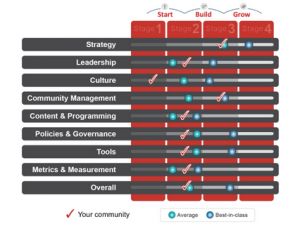By Rachel Happe, Co-Founder of The Community Roundtable.
 It’s an exciting day for us here at The Community Roundtable. We’re doing something we don’t often do – we’re rolling out a new service. Today, we introduce the Community Performance Benchmark, which you can think of as “GPS for Your Community Strategy.”
It’s an exciting day for us here at The Community Roundtable. We’re doing something we don’t often do – we’re rolling out a new service. Today, we introduce the Community Performance Benchmark, which you can think of as “GPS for Your Community Strategy.”
I love this analogy, because it fits so well with a lot of the conversations we already have with community managers and strategists. We talk about (and believe strongly in) articulating goals, developing roadmaps, and plotting your community journey. But just like a trip – knowing your destination isn’t all that valuable if you don’t know where you are today. Benchmarking is a tool to do just that – tell you where you are so you can figure out how to get where you need to go.
Why now? The idea of benchmarking isn’t new – but here are five reasons why the time for the Community Performance Benchmark has come.
1. The discipline of community management has matured
The practice of community management has been around in some form for decades, but until recently the practice has required experiential learning and it’s been treated as more of an art than a science. Now, social science research and our own research and work have helped to document and refine the core practices of community management.
2. We have the critical mass of strategic data to do it
Working with the members of TheCR Network over the past five years, we’ve been able to structure and refine practices to the point where we have objective markers of good community management. Whether from our annual State of Community Management research, our private roundtable calls with members or our advisory work with leading organizations, we now have foundational data to drive this new service.
3. Community management is the future of management
As networked communications environments spread across all aspects of organizations – from marketing, to collaboration and innovation – community management will become the de facto approach to general management because of its ability to generate more value for both individuals and organizations. Because of this, it is a strategic skill for organizations to develop now.
4. As technology accelerates, organizations can lose sight of the management changes required
Adopting technology without assessing how organizations are managed is a risky investment. Too often, organizations buy the tools and later figure out through trial and error how to best use them or, in the worst case, find the management and process change too challenging and abandon the platform. Often they become lured by the promise of the next new technology, hoping it will address issues, but discover instead that it just compounds them. Benchmarking management processes is a critical link that aligns technology adoption with required management changes.
5. Benchmarking data adds conviction and confidence to planning efforts. Which case would you rather make?
- “I need more community help. I’m feeling overwhelmed.”
- “I need more community help. We are managing our communities with about half of the staff of our competitors and we are behind in addressing executive adoption, both of which are leading to low engagement rates. We can improve community engagement by investing in community management staff and an executive coaching program.”
Benchmarking data makes it possible for you to make cases based on independent third-party analysis and comparison to best-in-class communities. More critically, it changes the conversation with stakeholders from “Why should I invest?” to “What do we want and how will we get there?” – a much more constructive and productive discussion – that is more likely to lead to approved budget requests.
We are excited to offer the Community Performance Benchmark service. It is a powerful tool for those we serve – community leaders. It helps them be successful where it matters – in getting the resources they need to create thriving, productive communities.
You can learn more about our Community Performance Benchmark in the Services section of the communityroundtable.com, or by clicking here.
